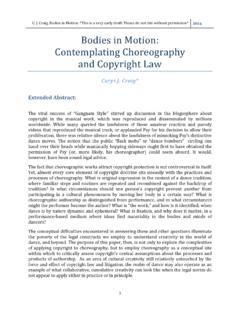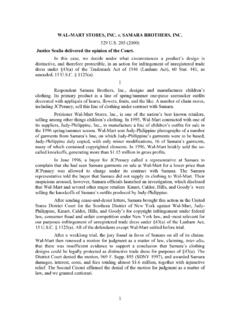Transcription of WAL-MART STORES, INC. v. SAMARA BROTHERS, INC.
1 529US1 Unit: $U38 [09-26-01 08:44:27] PAGES PGT: OPIN. OCTOBER TERM, 1999 205. Syllabus WAL-MART stores , INC. v. SAMARA BROTHERS, INC. certiorari to the united states court of appeals for the second circuit No. 99 150. Argued January 19, 2000 Decided March 22, 2000. Respondent SAMARA Brothers, Inc., designs and manufactures a line of children's clothing. Petitioner WAL-MART stores , Inc., contracted with a supplier to manufacture outfits based on photographs of SAMARA gar- ments. After discovering that WAL-MART and other retailers were sell- ing the so-called knockoffs, SAMARA brought this action for, inter alia, infringement of unregistered trade dress under 43(a) of the Trademark Act of 1946 (Lanham Act).
2 The jury found for SAMARA . WAL-MART then renewed a motion for judgment as a matter of law, claiming that there was insufficient evidence to support a conclusion that SAMARA 's clothing designs could be legally protected as distinctive trade dress for pur- poses of 43(a). The District Court denied the motion and awarded SAMARA relief. The Second Circuit affirmed the denial of the motion. Held: In a 43(a) action for infringement of unregistered trade dress, a product's design is distinctive, and therefore protectible, only upon a showing of secondary meaning. Pp. 209 216. (a) In addition to protecting registered trademarks, the Lanham Act, in 43(a), gives a producer a cause of action for the use by any person of any.
3 Symbo[l] or device .. likely to cause confusion .. as to the origin .. of his or her goods. The breadth of the confusion-producing elements actionable under 43(a) has been held to embrace not just word marks and symbol marks, but also trade dress a category that originally included only the packaging, or dressing, of a product, but in recent years has been expanded by many Courts of Appeals to encom- pass the product's design. These courts have correctly assumed that trade dress constitutes a symbol or device for Lanham Act purposes. Although 43(a) does not explicitly require a producer to show that its trade dress is distinctive, courts have universally imposed that require- ment, since without distinctiveness the trade dress would not cause confusion.
4 As to .. origin, as 43(a) requires. In evaluating distinc- tiveness, courts have differentiated between marks that are inherently distinctive i. e., marks whose intrinsic nature serves to identify their particular source and marks that have acquired distinctiveness through secondary meaning i. e., marks whose primary significance, in the minds of the public, is to identify the product's source rather than 529US1 Unit: $U38 [09-26-01 08:44:27] PAGES PGT: OPIN. 206 WAL-MART stores , INC. v. SAMARA BROTHERS, INC. Syllabus the product itself. This Court has held, however, that applications of at least one category of mark color can never be inherently distinc- tive, although they can be protected upon a showing of secondary mean- ing.
5 Qualitex Co. v. Jacobson Products Co., 514 U. S. 159, 162 163. Pp. 209 212. (b) Design, like color, is not inherently distinctive. The attribution of inherent distinctiveness to certain categories of word marks and product packaging derives from the fact that the very purpose of attach- ing a particular word to a product, or encasing it in a distinctive pack- age, is most often to identify the product's source. Where it is not reasonable to assume consumer predisposition to take an affixed word or packaging as indication of source, inherent distinctiveness will not be found. With product design, as with color, consumers are aware of the reality that, almost invariably, that feature is intended not to identify the source, but to render the product itself more useful or more appeal- ing.
6 Pp. 212 214. (c) Two Pesos, Inc. v. Taco Cabana, Inc., 505 U. S. 763, does not fore- close the Court's conclusion, since the trade dress there at issue was restaurant de cor, which does not constitute product design, but rather product packaging or else some tertium quid that is akin to product packaging and has no bearing on the present case. While distinguish- ing Two Pesos might force courts to draw difficult lines between product-design and product-packaging trade dress, the frequency and difficulty of having to distinguish between the two will be much less than the frequency and difficulty of having to decide when a prod- uct design is inherently distinctive. To the extent there are close cases, courts should err on the side of caution and classify ambiguous trade dress as product design, thereby requiring secondary meaning.
7 Pp. 214 215. 165 F. 3d 120, reversed and remanded. Scalia, J., delivered the opinion for a unanimous Court. William D. Coston argued the cause for petitioner. With him on the briefs were Kenneth C. Bass III and Martin L. Saad. Deputy Solicitor General Wallace argued the cause for the United States as amicus curiae urging reversal. With him on the brief were Solicitor General Waxman, Acting Assistant Attorney General Ogden, Edward C. DuMont, Barbara C. Biddle, Alfred Mollin, Albin F. Drost, and Nancy C. Slutter. 529US1 Unit: $U38 [09-26-01 08:44:27] PAGES PGT: OPIN. Cite as: 529 U. S. 205 (2000) 207. Opinion of the Court Stuart M. Riback argued the cause for respondent. With him on the brief was Mark I.
8 Levy.*. Justice Scalia delivered the opinion of the Court. In this case, we decide under what circumstances a prod- uct's design is distinctive, and therefore protectible, in an action for infringement of unregistered trade dress under 43(a) of the Trademark Act of 1946 (Lanham Act), 60 Stat. 441, as amended, 15 U. S. C. 1125(a). I. Respondent SAMARA Brothers, Inc., designs and manufac- tures children's clothing. Its primary product is a line of spring/summer one-piece seersucker outfits decorated with applique s of hearts, flowers, fruits, and the like. A number of chain stores , including JCPenney, sell this line of clothing under contract with SAMARA . Petitioner WAL-MART stores , Inc., is one of the Nation's best known retailers, selling among other things children's clothing.
9 In 1995, WAL-MART contracted with one of its sup- pliers, Judy-Philippine, Inc., to manufacture a line of chil- dren's outfits for sale in the 1996 spring/summer season. WAL-MART sent Judy-Philippine photographs of a number of garments from SAMARA 's line, on which Judy-Philippine's gar- ments were to be based; Judy-Philippine duly copied, with *Briefs of amici curiae urging reversal were filed for the International Mass Retail Association by Jeffrey S. Sutton and Robert J. Verdisco; for the Private Label Manufacturers Association by Arthur M. Handler; and for Scott P. Zimmerman by Charles W. Calkins. H. Bartow Farr III, Richard G. Taranto, and Stephen M. Trattner filed a brief for Ashley Furniture Industries, Inc.
10 , et al. as amici curiae urg- ing affirmance. Briefs of amici curiae were filed for the American Intellectual Property Law Association by Sheldon H. Klein, Michael A. Grow, and Louis T. Pirkey; for the International Trademark Association by Theodore H. Davis, Jr., Morton D. Goldberg, and Marie V. Driscoll; and for Payless Shoesource, Inc., by William A. Rudy and Robert Kent Sellers. 529US1 Unit: $U38 [09-26-01 08:44:27] PAGES PGT: OPIN. 208 WAL-MART stores , INC. v. SAMARA BROTHERS, INC. Opinion of the Court only minor modifications, 16 of SAMARA 's garments, many of which contained copyrighted elements. In 1996, WAL-MART briskly sold the so-called knockoffs, generating more than $ million in gross profits.



















